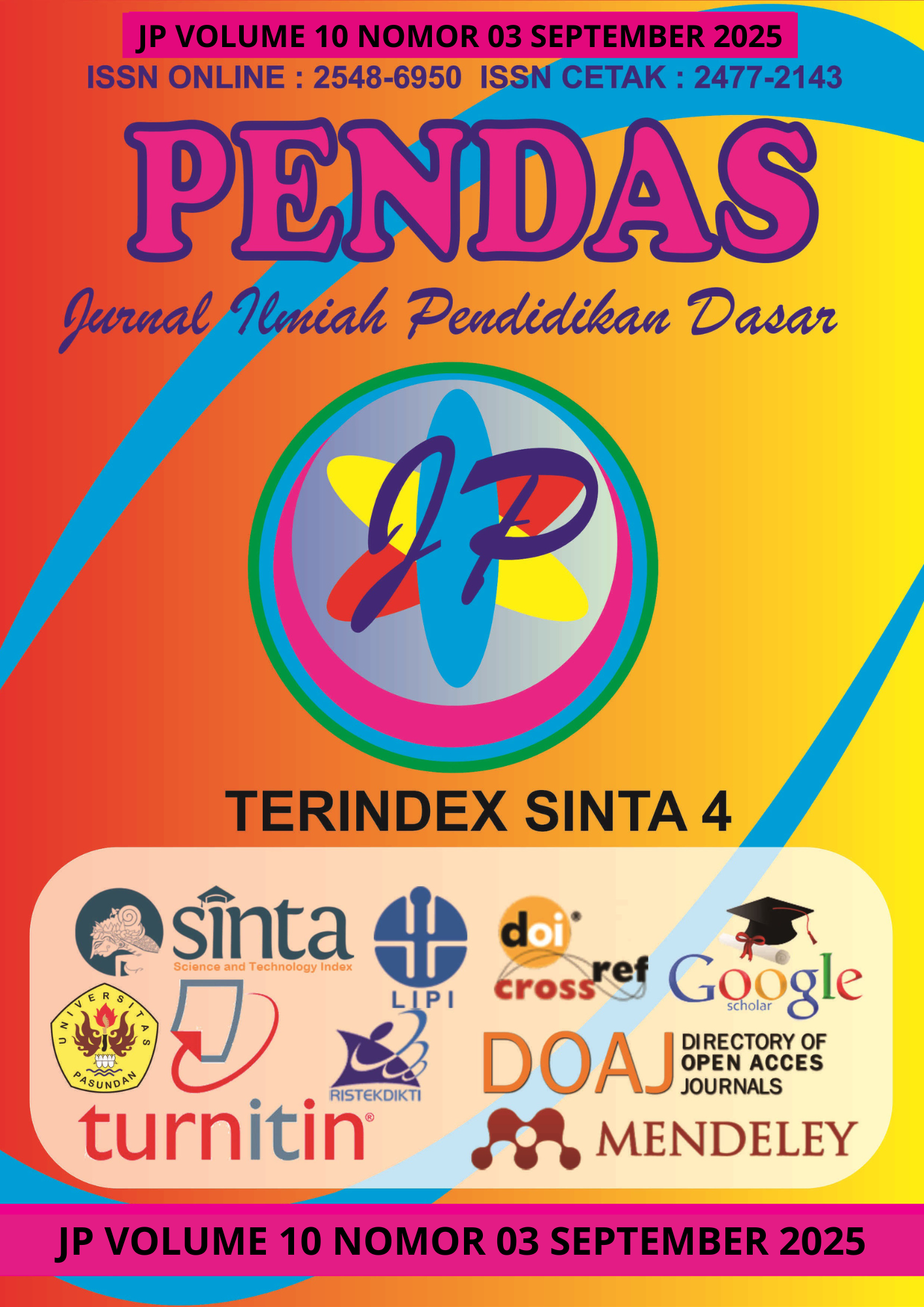ANALISIS PEMBELAJARAN BERDIFERENSIASI MELALUI PENDEKATAN STEAM (SCIENCE, TECHNOLOGY, ENGINEERING, ART, MATHEMATIC) PADA KEMAMPUAN LITERASI NUMERASI SISWA KELAS III SEKOLAH DASAR NEGERI 02 JATIYOSO TAHUN AJARAN 2024/2025
DOI:
https://doi.org/10.23969/jp.v10i03.29517Keywords:
differentiated learning, STEAM, Literacy Numeracy skillsAbstract
Analysis of Differentiated Learning through the STEAM (Science, Technology, Engineering, Art, Mathematic) Approach on the Numeracy Literacy Skills of Grade III Students of State Elementary School 02 Jatiyoso in the 2024/2025 Academic Year. The purpose of this study is to analyze the application of STEAM differentiated learning, in relation to the numeracy literacy skills. This research is a qualitative case study type, allowing researchers to investigate or analyze a phenomenon comprehensively, intensively, in detail, and in depth, the research phenomenon is still holistic, complex, and dynamic. Through qualitative research methods, researchers will analyze differentiated learning through the STEAM approach which will be linked to how the numeracy literacy skills. The results of the study indicate that the application of differentiated learning through the STEAM approach provides good learning for the numeracy literacy skills. This finding was obtained through triangulation of data that had been processed by researchers through observation, interviews, documentation, and tests consisting of 2 types of tests, namely formative evaluation in the form of the Mathematics Problem Solving Test (TPMM) and the Project Problem Solving Test (TPSP) which showed progress in the ability to read story problems, identify important information, and solve mathematical problems based on real contexts. This is in accordance with the approach used, namely STEAM which is centered on projects based on real-world problems, and is a multidisciplinary learning approach that is integrated to foster and improve the realization of the objectives of the independent learning curriculum designed according to 21st century skills.
Downloads
References
Astuti, L., Mayasari, D., & Setyowati, R. (2023). Pengaruh Pendekatan Steam dengan Model Problem Based Learning (PBL) terhadap Hasil Belajar Kognitif Siswa Pembelajaran IPA SDN 15 Singkawang. EDUKASIA: Jurnal Pendidikan Dan Pembelajaran, 4(2), 2063–2070. https://doi.org/10.62775/edukasia.v4i2.547
Azkiya Rizka Wahda, F. R. K. S. (2024). Analisis Asesmen Diagnostik Tentang Gaya Belajar Untuk Pembelajaran Matematika Berdiferensiasi Di Sekolah Dasar Wahda Rizka Azkiya 1* , Fine Reffiane 2 , Kurnia Selunawati 3 , Qoriati Mushafanah 4 1)2). 4(3), 150–159.
Bin Amiruddin, M. Z., Magfiroh, D. R., Savitri, I., & Binti Rahman, S. M. I. (2022). Analysis of The Application of The STEAM Approach to Learning In Indonesia: Contributions to Physics Education. International Journal of Current Educational Research, 1(1), 1–17. https://doi.org/10.53621/ijocer.v1i1.139
Duma, S. Y. (2024). The Effectiveness of Mathematics Learning with the STEAM Approach in Improving Students ’ Critical Thinking Skills. 1(September), 1–16.
Sugiyono. 2025. Metode Penelitian Kualitatif, Kuantitatif, dan R&D. Bandung : Alfabeta.
Adi Kadek. 2024. Buku Ajar Pembelajaran Berbasis STEAM. Bali : Nilacakra
Jahrir, A.S., Tahir.M., Aswati. 2024. Pembelajaran Diferensiasi. Banjarnegara : PT. Penerbit Qriset Indonesia
Hayati, R., Prima, W., Wulandari, S., Yunita, A. P., Mulyati, A., & Azmi, K. (2023). Model Pembelajaran STEAM (Science, Techonology, Engineering, Art, and Math) dalam Pembelajaran Matematika Sekolah Dasar: Pembelajaran Berdiferensiasi. Edukatif : Jurnal Ilmu Pendidikan, 5(6), 2591–2603. https://doi.org/10.31004/edukatif.v5i6.5723
Herawati, E., Priyanti, N., & Kasih, D. (2024). Penerapan Model Pembelajaran Berdiferensiasi Pada Pelajaran Matematika Kelas 1 Di SDN Kebon Jeruk 06 Jakarta. 3(3), 722–733.
Hidayah, N., & Prayogo, M. S. (2022). Penggunaan Model Steam (Science, Techonology, Engineering, Art, and Mathematics ) Pada Pembelajaran Ipa Untuk Meningkatan Prestasi Belajar Peserta Didik Di Kelas Va Sd Negeri 2 Loloan Barat. IJIT: Indonesian Journal of Islamic Teaching, 5(2), 135–145. https://doi.org/10.35719/ijit.v5i2.1691
Pasca, W., & Waluya, B. (2024). Integrasi STEAM dalam Meningkatkan Kemampuan Berpikir Kritis Siswa Sekolah Dasar. PRISMA: Prosiding Seminar Nasional Matematika, 7(1), 301–308.
Risma, R. (2024). Deskripsi Kemampuan Literasi Numerasi Siswa Dalam Menyelesaikan Soal Cerita Matematika Kelas II di SD Negeri Jatingarang. IJEDR: Indonesian Journal of Education and Development Research, 2(2), 861–869. https://doi.org/10.57235/ijedr.v2i2.2276
Rohana, H., Putri, H., Huda, L. M., Putri, M. S., Amalia, N., & Zulaykha, U. (2024). Analisis Pembelajaran Diferensiasi pada Kurikulum Merdeka di Sekolah Dasar. Journal Of Elementary School Education (Jouese), 4(1), 330–336. https://doi.org/10.52657/jouese.v4i1.2232
Sugiyanti, R., Harapan, E., & Wahyuningrum, E. (2023). Pengaruh Pendekatan Steam Dan Motivasi Belajar Terhadap Hasil Belajar Matematika Siswa Kelas V Sd. Pendas : Jurnal Ilmiah Pendidikan Dasar, 8(2), 5837–5848. https://doi.org/10.23969/jp.v8i2.10171
Supianti, I. I., Yaniawati, P., Bonyah, E., Hasbiah, A. W., & Rozalini, N. (2025). STEAM approach in project-based learning to develop mathematical literacy and students’ character. Infinity Journal, 14(2), 283–302. https://doi.org/10.22460/infinity.v14i2.p283-302
Downloads
Published
Issue
Section
License
Copyright (c) 2025 Pendas : Jurnal Ilmiah Pendidikan Dasar

This work is licensed under a Creative Commons Attribution 4.0 International License.














































